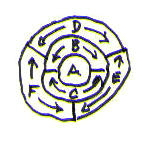

The 2001 Quaker Peace Roundtable:
Steve Angell - The Alternatives to Violence Project (AVP) -- Continued -- 2
Exercises involve affirmation. People may be paired up, each talking to a partner about
what they like about themselves. We are developing a sense of community and trust
building, developing communication skills, skills in cooperation and conflict handling.
At this point in the workshop, two people who had had experience as facilitators added
their comments. Bob Barns talked about running a workshop in India in which, at the
first session he found that officers and prisoners were together and large armchairs had
been provided for the officers. He specified before the session began that the big chairs
had to go and that participants had to come in street clothes, not uniforms. Almost all
the
officers returned under these conditions, except for one who spoke only Urdu.
Marge Schlitt described another type of prison program called Agression Replacement
Treatment (ART) which is given by the facility. They go straight to conflict handling
skills
using a lecture format. The idea is that the prison maintains control of what happens.
Steve Angell developed a schematic presentation which, he learned, is called a mandala.
Where A is TP, transforming power by which one can
change situations of conflict into non violence and D
("my favorite," says Steve Angell) is "Expect The Best." The
alternative to this is, of course, expect the worst
in a situation. This leads to thinking about how we
can "get" the other person. For example, you feel
threatened so you carry a weapon, this, in turn
has negative consequences.
The other parts of the mandala are:
B Respect for Self
C Caring for Others
E Ask for Nonviolent Path
F Think Before Reacting
Ralph Rudd talked about the "playfulness aspect" of workshops. Exercises are
called
"light and livelies."
Question: How do you handle disrupters?
Answer: We use a signal, everybody slapping their knees, for example.
We also use adjective names in the group. The adjective is selected
by the person and is
positive. I am Smiling Steve and in second level groups Super Steve (this is so that when
people greet me I know which group they have been in). In response to another question,
Steve said that there has also been some use of AVP in federal prisons
A school system in Syracuse asked if they could use our name but there were important
differences. The facilitators were paid and the others were a class, not volunteers. After
talking to us about this, they chose another name, Help Increase the Peace, or HIP, and
worked under the guidence of the local AFSC.
We now have manuals for people on the first and second levels and tbr facilitators.
These
have been translated into other languages, Serbo-Croation most recently (with separate
versions for Serbs and Croats), also German, French, Russian and Spanish in both
Mexican and Puerto Rican versions.
Bob Barns passed out some wallet sized cards printed with goals of the AVP. These, we
were told, are popular with prisoners. Marge Schlitt added that the program has spawned
support groups and alumni groups. In New York people who have been released from
prison can join a group called "Landing Strip." They can also become
facilitators for new
AVP workshops.
